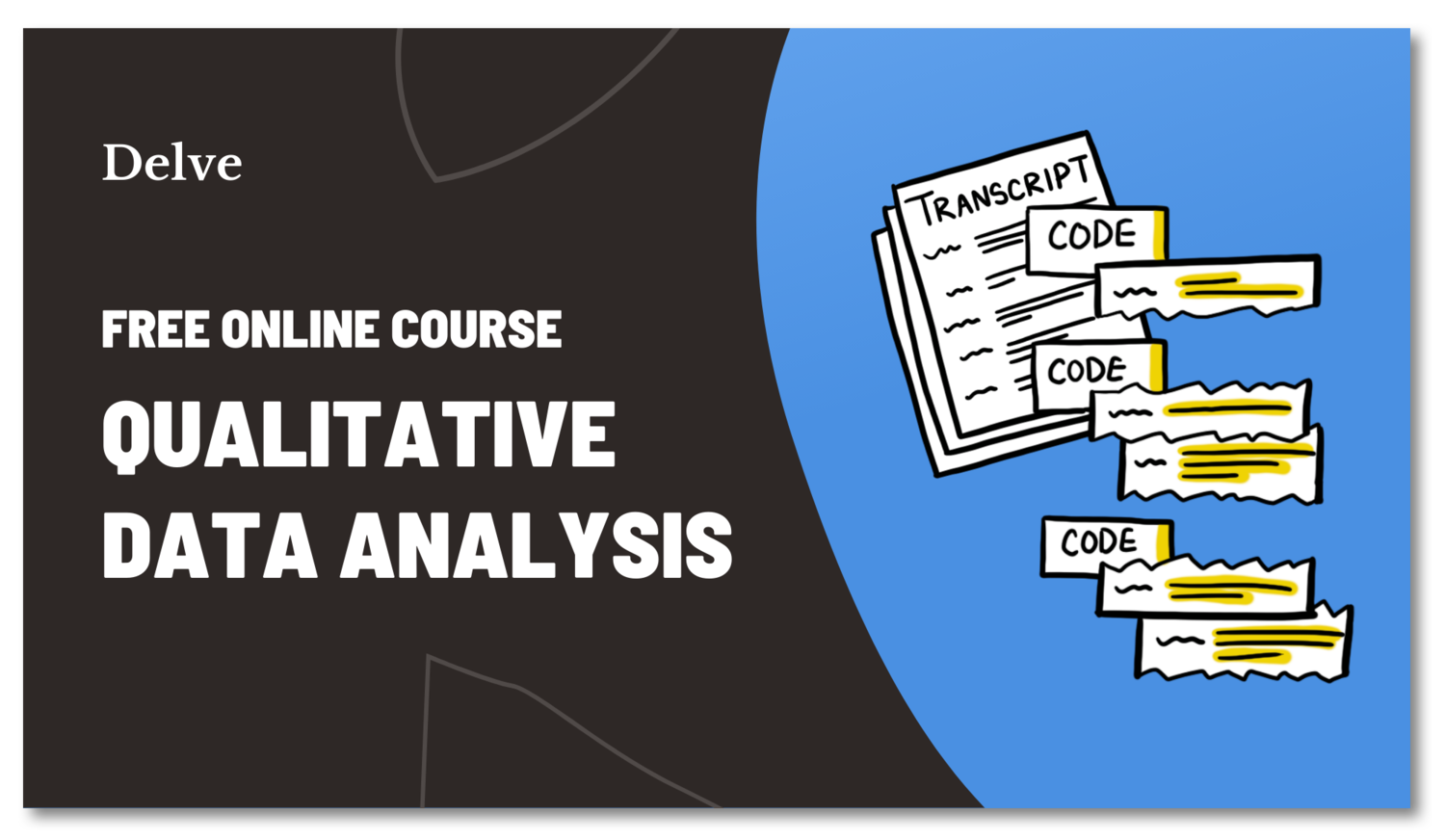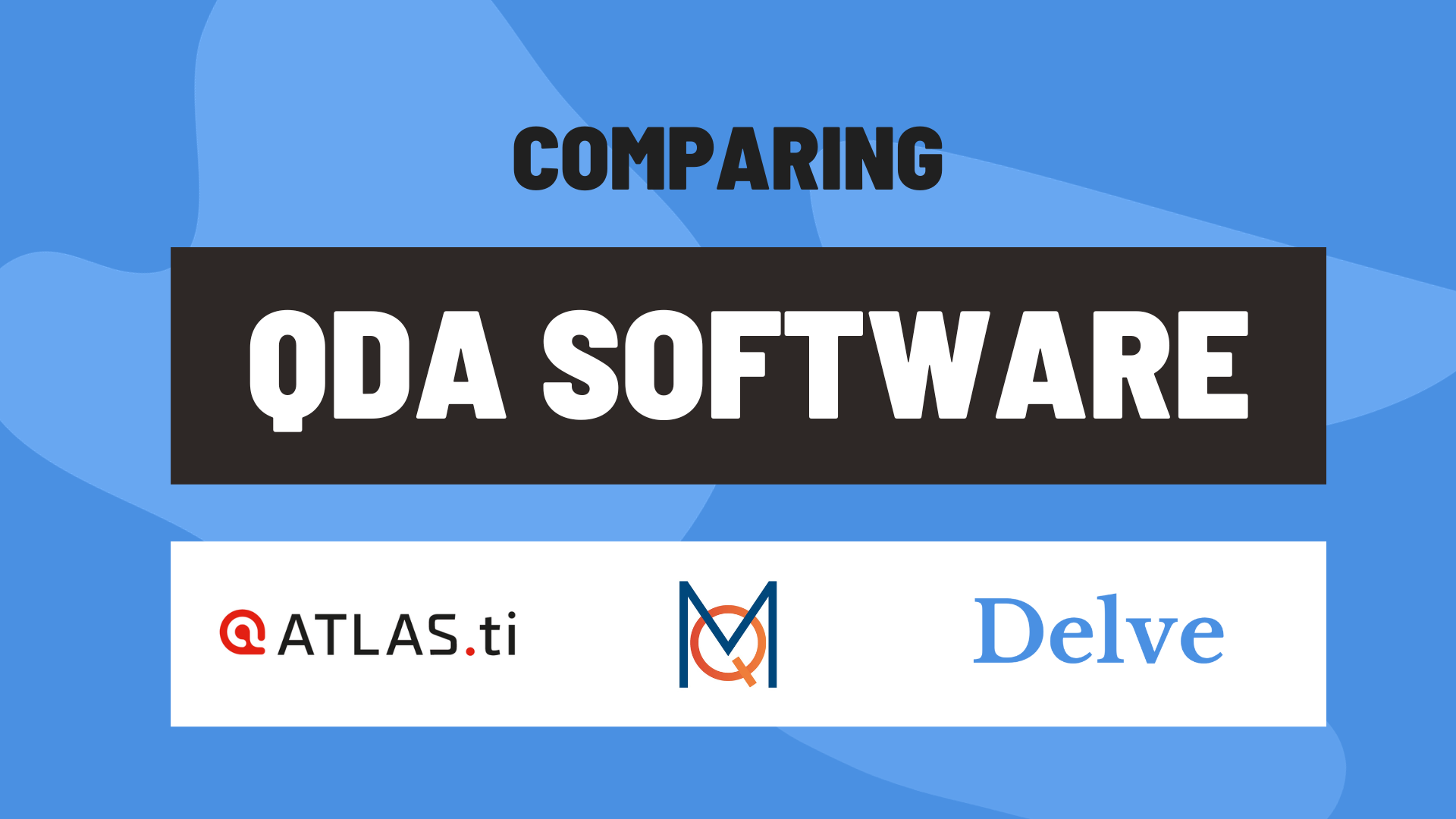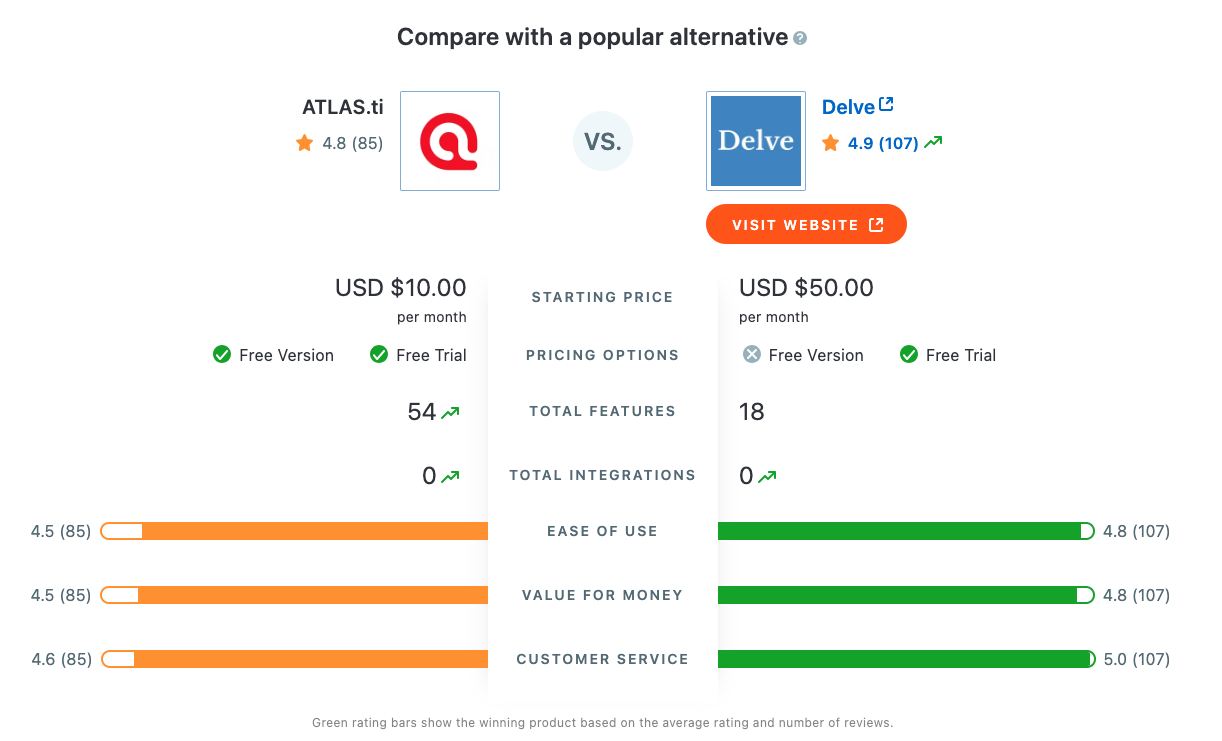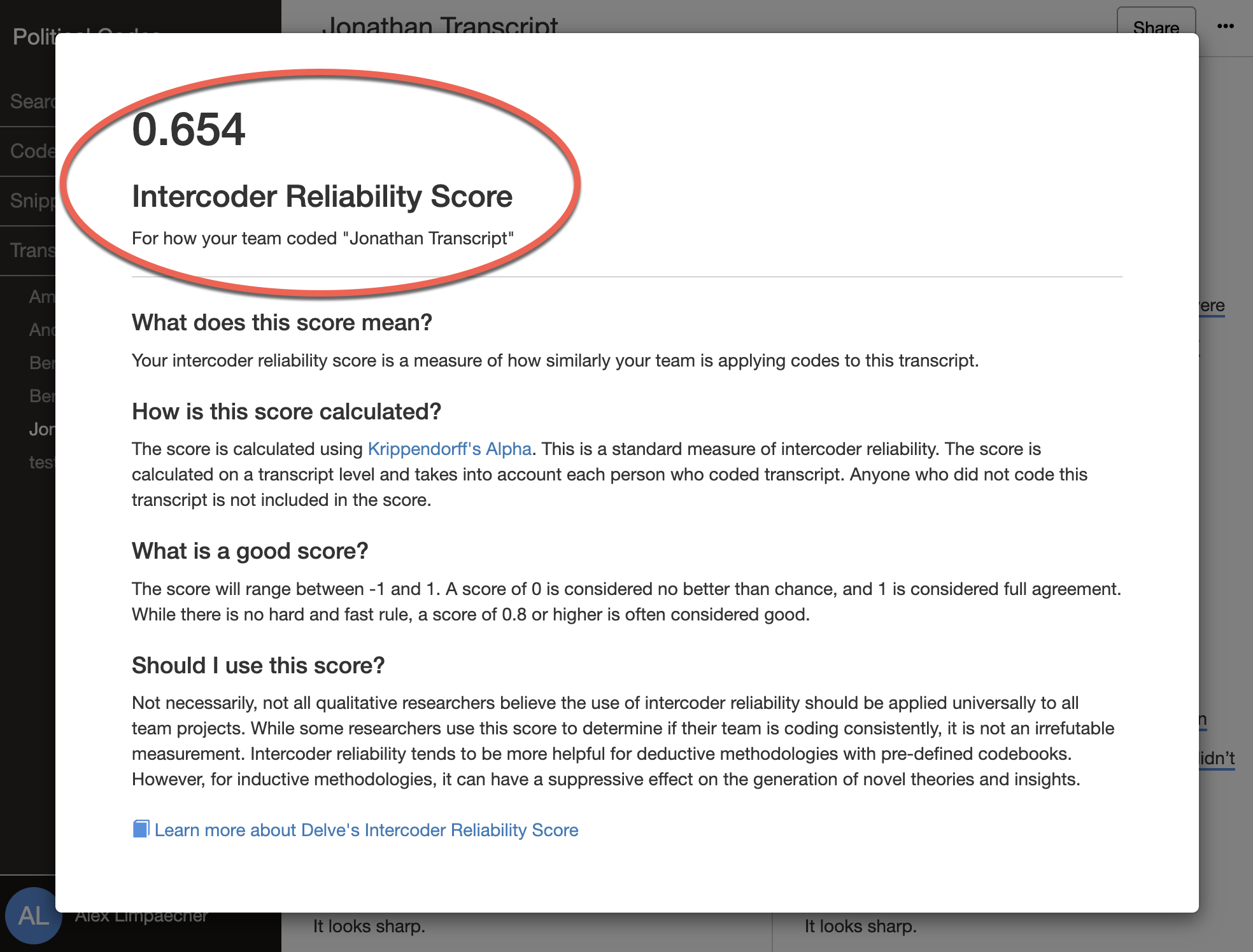MAXQDA vs. ATLAS.ti vs. Delve: What's the Best Qualitative Coding Software?
Qualitative data analysis (QDA) software is often the tool of choice for qualitative researchers. It's the tool that can truly make a difference in the quality and efficiency of your work. But when it's time to pick the best QDA software for your needs, a few key considerations come into play.
In this article, we'll compare three popular QDA software options: ATLAS.ti, MAXQDA, and Delve. We'll introduce each option, explore their strengths and weaknesses, and help you choose the right tool for your specific qualitative research needs.
But before we jump in, let’s clear up a frequent point of confusion amongst qualitative researchers.
Are QDA Software and Computer-Assisted Qualitative Data Analysis Software (CAQDAS) the Same Thing?
Yes, QDA software and computer-assisted qualitative data analysis (CAQDAS) are terms used to describe the same software. QDA software is also known as CAQDAS, and vice versa.
Both terms describe software that helps researchers organize, code, and analyze data to identify patterns and themes. QDA software is probably used more often because it's a bit easier to say, type, and remember.
As you research ATLAS.ti, MAXQDA, and Delve, you may see either acronym, so we wanted to clarify there is no distinction between the terms.
How to Choose the Right Qualitative Coding Software
Now, let’s establish some criteria for selecting the best QDA software for your unique research needs. Doing so can streamline your decision-making process and avoid investing time and resources in an unsuitable tool.
Here are four ways to approach your ultimate decision:
Your Budget
Qualitative data analysis software comes in a wide range of price points. Some offer discounts for students and educators, while others do not. There are monthly and annual subscription options and also one-time purchases. Finding a tool that aligns with your budget while meeting your research requirements is essential.
Your Time
Qualitative analysis is a time-intensive process. If you have tight research deadlines, consider the time it takes to learn and adapt to a new QDA software. Efficiently integrating a new tool into your workflow is crucial to meeting your research objectives.
Your Needs
Identify the specific features that are important for your research. Do you need software capable of handling extensive datasets? Are collaboration tools essential for your research team? Pinpointing your needs will help you find a software solution that simplifies and streamlines your qualitative research.
Your Experience Level
Consider your familiarity with qualitative analysis. If you're new to the field, look for software that is user-friendly and facilitates the discovery of nuanced insights. For experienced researchers, more sophisticated features may be more desirable.
Once you've taken these factors into account, you can start to deduce the QDA software that best aligns with your budget, time constraints, research goals, and experience.
Comparing ATLAS.ti vs. MAXQDA vs. Delve
Now, let's look at the features and capabilities of ATLAS.ti, MAXQDA, and Delve.
While these QDA software programs share standard functions related to qualitative analysis, they differ significantly in terms of user interfaces, features, pricing structures, supported operating systems, and collaborative capabilities.
ATLAS.ti: A Sophisticated Coding Tool
ATLAS.ti has been a prominent player in the CAQDAS field for over two decades. It is a sophisticated tool with advanced functionality designed to assist researchers in various qualitative research methods. While ATLAS.ti offers an extensive feature set, it may have a steeper learning curve, making it more suitable for experienced researchers.
Key Features:
Functionality: ATLAS.ti provides a wide array of features, making it suitable for in-depth research projects.
Desktop and Web Versions: It offers both desktop and web versions to cater to various user preferences and needs.
Sophisticated Software: The software is robust but complex, sometimes to a fault. It is best for experienced researchers or those with enough time to learn advanced software.
Best For
Extensive research endeavors. ATLAS.ti shines with its formidable power and sophistication. It's tailor-made for seasoned researchers who have substantial experience with qualitative analysis.
Licensing Model
Desktop (device-specific)
Need to update software
Need upgrades for all features
Web version (limited functionality ⚠️)
Price
$895+/year
Full pricing information for ATLAS.ti.
⚠️ You can use both the desktop and web versions of ATLAS.ti together, but they don’t automatically synchronize. ATLAS.ti Web (the more affordable option) also does not support all ATLAS.ti features. You can’t set up a mixed-team project where some people work in the desktop version and others in the web version.
MAXQDA: Versatile Yet Complex
MAXQDA is recognized for its versatility and ability to support mixed-method research. It offers tools for coding, analyzing, and visualizing qualitative data, catering to researchers across disciplines. However, customers give the company low marks for customer service and overall training resources, lengthening the learning curve. Its pricing may also not align with all budgets.
Key Features:
Versatile: MAXQDA accommodates various qualitative research methods.
Steep Learning Curve: Its comprehensive functionality may require a significant learning curve, exacerbated by poor customer service and learning resources.
Price Point: MAXQDA's pricing may not align with all budgets, especially for students.
Best For
MAXQDA shines with its versatility for mixed-method research. It's tailor-made for seasoned researchers well-versed in the nuances of qualitative analysis.
Licensing Model
Desktop (device-specific)
Requires software updates
Needs upgrades to use collaborative features
Price
$232 per year (desktop, device-specific, no collaboration)
$432 per year (MAXQDA TeamCloud subscription)
Full pricing information for MAXQDA.
Delve: Simplifying Qualitative Data Analysis
Delve is a QDA software known for its user-friendliness, collaboration capabilities, and affordability. It caters to a wide range of users, making it an ideal choice for researchers new to qualitative data analysis or those seeking a cost-effective coding solution.
Key Features:
User-Friendly Interface: Delve's interface is intuitive, ensuring a smooth learning curve for users.
Remote Collaboration: As a web-based tool, Delve facilitates seamless collaboration among researchers, regardless of their physical locations.
Effortless Project Sharing: Collaborative research is simplified with Delve's sharing feature, allowing for easy project sharing and role assignment.
Cross-Platform Compatibility: Delve ensures consistent performance across all major operating systems, enhancing flexibility.
Automated Intercoder Reliability: Delve automates intercoder reliability scores, saving time and improving the accuracy of qualitative analysis.
Side-By-Side Coding Comparisons: Researchers can code independently and later compare their coding approaches for better insights.
Responsive Customer Support: Delve's customer support is highly responsive, providing timely assistance when needed.
Qualitative Analysis Learning Center: For those new to qualitative analysis, Delve offers various learning resources and tutorials.
Flexible Academic Pricing: Delve offers budget-friendly options, recognizing the financial constraints faced by students.
Best For
Delve caters to a wide range of users, including students, academics, market researchers, analysts, and social science professionals. It is ideal for those new to qualitative data analysis or seeking an efficient, budget-friendly alternative focused on collaborative qualitative analysis.
Licensing Model
100% web-based (accessible from any device)
Price
$432 per year (with annual discount)
$50 per month (commercial pricing)
$18 per month or $200 per year (with academic discount)
Full pricing information for Delve.
Here’s a table to show how these QDA software options stack up:
| Feature | Atlas.ti | MAXQDA | Delve |
|---|---|---|---|
| Base Pricing | $895+/year | $232+/year | $432/year (with annual discount) |
| Education Pricing | $120+/year (web-app with limited features) | $104/year (no collaboration, limited features) | $200/year (full features and functionality) |
| Upgrades | $1397+/year (full features with collaboration) | $1391+/year (full features with collaboration) | No upgrade required |
| Ease of use | Sophisticated | Complex | Intuitive |
| Licensing | Desktop, limited web-based option | Desktop, web-based add-on | Web-based |
| Best for | Experienced researchers who need a sophisticated coding tool. | Researchers with experience using other QDA tools. | Researchers who are new to qualitative data analysis, work in groups, or work remotely. |
This comparison lets you make an informed decision based on your research needs, experience level, and budget constraints.
While Delve offers user-friendliness, remote collaboration, and affordability, ATLAS.ti and MAXQDA have their own strengths that cater to specific research contexts.
Qualitative analysis doesn't have to be overwhelming
Take Delve's free online course to learn how to find themes and patterns in your qualitative data. Get started here.

User Reviews: ATLAS.ti vs. MAXQDA vs. Delve
Now let’s take a look at what actual users of ATLAS.ti, MAXQDA, and Delve say about each QDA software. To make it easier to compare quickly, we organize these comparisons based on what most researchers consider important when they pick the right option for themselves.
Pricing
❌ What Customers Say About MAXQDA
“Cost restrictive for students.” Read more.
“It is rather expensive and I would like to find some software that offers a very low-cost student edition. Our students are not going to be doing as much research as some doc students as they are leaders in public schools. Purchasing an expensive product doesn't make sense.” Read more.
“Because MAXQDA is quite costly, it is a barrier that detracts from more widespread use.” Read more.
❌ What Customers Say About ATLAS.ti
“Student licenses are valid for only 2 year and will expire. If you are a grad student who expends hundreds of hours on coding and analyzing your data with AtlasIT, you'll find that you are unable to continue to work on your project after you graduate unless you buy a commercial license. The expenses will add up rapidly. Student licenses should not expire and prevent users from continuing to work with their data using their purchased version of the software.” Read more.
✅ What Customers Say About Delve
“Delve is less expensive than other options and easier to use.” Read more.
“Very reasonably priced.” Read more.
“The education pricing is so inexpensive that Delve would be highly appropriate for students just learning how to code as well as seasoned researchers. It's also flexible enough that you only pay for the time that you're using the program - in my case I used it all the time at first, then paused my membership and reopened it when I had new data and analysis to do.” Read more.
Cloud-based Collaboration
❌ What Customers Say About MAXQDA
“A downside of using MaxQDA was that it had to be purchased for each individual laptop (as far as I am aware) and so we were limited to coding on just one device.” Read more.
“The teamwork options are not as seamless as they could be. You have to set up coding in a particular way or merges do not work properly. We find there are not as much functionality as we would like when comparing coding results between different coders.” Read more.
“You cannot have multiple users working on the same project and automatically save. merging projects is not a very obvious function.” Read more.
❌ What Customers Say About ATLAS.ti
“The functionality for teams is CLUNKY! Not easy to work together at all in my opinion.” Read more.
“The gap between Mac and Windows is significant and creates the most issues for users. When training a hybrid course, switching back and forth is tedious and it's always a little awkward when I have to say, "sorry Mac users, this isn't as easy or isn't available..." Read more.
✅ What Customers Say About Delve
“Delve is very easy to learn and use individually or as a team. Using Delve has shortened our time to process text for coding and organizing for presentations. Used with time codes, it can also shorten video editing times. We've used several other products and found Delve to be a perfect complement to our workflow.” Read more.
“We were up and running with Delve within minutes. It was very intuitive to use, with very quick setup. We were able to easily collaborate and facilitate our thematic analysis process without a steep learning curve and at a very reasonable price.” Read more.
“Wonderful user interface and coding process, loved how easy it is to collaborate with others.” Read more.
“Most importantly, Delve makes it easy and intuitive to share my results with my collaborators.” Read more.
“Loved how easy it is to collaborate with others.” Read more.
“It works easily when collaborating with others on a qualitative project. When coding I like the flexibility of this software to rename, regroup as you conduct your analysis.” Read more.
Learning Curve
❌ What Customers Say About MAXQDA
“The actual coding process can be unintuitive and has a steep learning curve.” Read more.
“Licensing, different devices and shared projects can get complicated. Also, getting the most out of it does require a rather steep learning curve.” Read more.
“There is a required learning curve for MAX QDA. You will need to commit some time to learning the software to succeed.” Read more.
❌ What Customers Say About ATLAS.ti
“This software requires specific training and a learning curve to assimilate its features and get the most out of it.” Read more.
✅ What Customers Say About Delve
“Delve has made coding qualitative data so simple and fast. The user-friendliness makes it a must-have for any qualitative researcher.” Read more.
“Delve was very easy to use and it was quick to pick up. All of the functions I used were user-friendly and perfect for my research project.” Read more.
“There is no steep learning curve involved. You simply upload or paste your transcripts and start coding.” Read more.
“For a first-time researcher like me, Delve made the process so simple and effective. It helped me save time that I might've wasted in trying to learn another software that wouldn't be as user-friendly.” Read more.
Customer Support / Tutorials
❌ What Customers Say About MAXQDA
“I also wish tutorials and professional learning development would be more accessible. [...] It sometimes becomes overwhelming and difficult without guidance.” Read more.
❌ What Customers Say About ATLAS.ti
“The YouTube videos explaining how to use Atlas.ti are TERRIBLE.” Read more.
"Worst customer support I've ever experienced!" Read more.
✅ What Customers Say About Delve
“Very simple and doesn't require any long training hours. Just go through 30 min long quick short videos and you are all set.” Read more.
“Delve offers a training course and a follow-along training to help beginners who are coding for the first time.” Read more.
“It has very good tutorials that explain in detail how to use the product. Also, the tutorials are short so you don't have to spend lots of time to understand how the tool works. This aspect was very important for me, as I didn't had lots of time to work with the data.” Read more.
“The customer support is superb! Support from Delve was so responsive, I was extremely pleased with the level of services I received.” Read more.
“One of the things that I like most about this software is that the support team is incredibly responsive and helpful. They answer questions quickly.” Read more.
User Interface
❌ What Customers Say About MAXQDA
“The user interface of this software leaves a lot to desire.” Read more.
“I found it a bit confusing to use the software to organize the data once all of the data is coded. There are supposedly a ton of functions that allow you to organize the data, yet, even with doing the online, it still felt difficult to me.” Read more.
“While coding, there is an interface on the left that is very restrictive. […] I think the program is confusing, especially during analysis.” Read more.
❌ What Customers Say About ATLAS.ti
“It is difficult to use because of the multiple buttons on its entrance platform. In addition, making interpretations can be complicated if you do not handle it frequently.” Read more.
“It is difficult to use because of the multiple buttons on its entrance platform. In addition, making interpretations can be complicated if you do not handle it frequently.” Read more.
✅ What Customers Say About Delve
“The UI is very straightforward and simple to use. Coding text is very easy and tags are automatically compiled into a list for easy access. You can navigate/sort your transcripts by code, meaning it's easy to cross-reference.” Read more.
“The simplicity and the ease in navigating their tool is commendable.” Read more.
“Delve was easy to use. I used it for my doctoral research and it helped me to organize my interview information into codes and categories.” Read more.
“Delve's beauty is in it's simplicity and ease of use, yet it is intelligent enough to get the thematic analysis done for you in a very fast space of time, at a much more detailed rate than us mere mortals. Highly recommended, company and the software.” Read more.
“Great feature set is very intuitive to learn and start using right away. Interface makes it very easy to construct codes, highlight and code text and view excerpts in different ways. Being able to code as little as a word or as much as a paragraph (or multiple paragraphs) results in more robust coding.” Read more.
Auto-Save Work
❌ What Customers Say About MAXQDA
“The way it saves your work can be a bit confusing at first and can cause some anxiety about whether it saved properly or not.” Read more.
“We had to upload copies in a way that was confusing and sometimes the work we did was saved to the wrong place.” Read more.
❌ What Customers Say About ATLAS.ti
“Crashes and loses data! After reporting, the problem has not been fixed…” Read more.
✅ What Customers Say About Delve
“Since I use the software to analyze my data directly through the website, I don't need worry about losing my progress when my computer breaks down. It happened several times during my dissertation, but the work on Delve was always perfectly saved.” Read more.
Bugs / Research Delays
❌ What Customers Say About MAXQDA
“I came across glitches sometimes that can be frustrating. Although MAXQDA saves projects automatically, there have been instances of the software freezing or slowing down, even on small datasets.” Read more.
❌ What Customers Say About ATLAS.ti
“Web version works too slowly and errors occur when encoding PDF files. There are also problems when exporting projects so that it is not even possible to continue working in the desktop version.” Read more.
✅ What Customers Say About Delve
“The product is very easy to both access and use. You don't need to download any software, it always saves your work.” Read more.
“It is easy-to-use, with a clean interface that required no lag-time of reviewing instructions or familiarizing myself with the tool.” Read more.
“Using Delve saves me tremendous amounts of time, and brings my research insights more to life! It saves me loads of time when preparing a report and helps me digest qualitative themes more efficiently.” Read more.
"Fantastic qualitative analysis and organization tool that saves time!" Read more.
“It is a well thought out and efficient piece of software well worth using as a student or researcher.” Read more.
Explore all of the Delve user reviews.
Comparing Delve to ATLAS.ti and MAXQDA
Take a look at how ATLAS.ti, MAXQDA, and Delve rank on user reviews.
ATLAS.ti vs. Delve
MAXQDA vs. Delve
Why Choose Delve?
Designed by researchers, Delve simplifies all facets of the qualitative research process. It offers powerful coding capabilities that usher in a new era of efficiency, granting you more control over your research structure. No more lost notes, no more corrupt files, no more manually merging data.
Check out these specific features and capabilities that set Delve apart:
Simplicity in Software
Delve sets itself apart with its intuitive interface, eliminating the need for extensive training or the acquisition of specialized jargon. Users can dive right into their research without the steep learning curve associated with other QDA software.
Collaborative Project Sharing
Collaboration is at the core of modern qualitative research, and Delve excels in this area. Using Delve, sharing your projects with fellow researchers for peer-debriefing is hassle-free. Adding or removing users and assigning specific roles can be accomplished with a few clicks, streamlining your teamwork.
Can Edit: Grants full project access for content addition, coding, memos, and inviting others, but requires an active subscription.
Can View: Allows project viewing without editing rights. It's free, and no subscription is needed for viewing.
Memos Made Simple
Analytical memos lead to more effective research. Memos can help. Delve's analytical memo feature lets researchers jot down quick notes during data collection, coding, or analysis. These memos help keep thoughts, ideas, and questions organized, contributing to more nuanced research results.
Reliable Intercoder Scores
Delve simplifies the coding process by automating intercoder reliability scores. This not only saves time but also ensures accuracy and consistency in qualitative analysis. With Delve, you can trust in the efficiency and reliability of your coding process.
Comparing Codes Collaboratively
Delve fosters collaborative coding with side-by-side comparisons of coding decisions on the same transcript. Users can code individually and then compare their work, enhancing teamwork while maintaining independence.
Responsive Customer Support
Delve users commend the exceptional customer service. Whether through email or live chat, the support team responds promptly to questions and challenges. Timely support minimizes delays, ensuring that research proceeds on schedule.
The Learning Hub
Qualitative analysis can be intricate. Delve simplifies the learning process, offering coding tips, YouTube tutorials, an intuitive help center, and insights into qualitative research methods through the Learning Center. This resource equips you with the knowledge you need for any qualitative research project.
Code Descriptions for Clarity
Delve allows researchers to write down thoughts within the code detail page or share them with colleagues. Delve code descriptions provide context, connecting them to the quotes that inspired them. This feature aids in understanding the rationale behind code assignments.
Flexible Account Management
Delve understands the financial constraints faced by students. It offers the flexibility to pause or cancel accounts as needed. This accommodating policy specifically aligns with the realities of student life, providing peace of mind in managing expenses.
Adapting to Remote Research
Remote research is an increasingly common practice in qualitative research. Delve's web-based coding software caters to this nascent trend, offering features that facilitate remote collaboration and adapt to the demands of modern research practices.
Consistency Across Operating Systems
Delve ensures uniform performance on all operating systems, eliminating compatibility concerns. Whether on Windows, macOS, or Linux, Delve offers a seamless transition between devices. No matter where you are or what device you use, you can easily code with Delve.
Delve: The Simple QDA Software Solution
Delve emerges as an ideal choice for researchers seeking a user-friendly, collaborative, and cost-effective CAQDAS solution. As the ever-evolving landscape of qualitative data analysis changes, Delve stands out as a practical and efficient tool to support your research endeavors.
Experience accelerated research with Delve. Explore Delve's 14-day free trial and unlock the potential of qualitative analysis in a simplified manner. Get started today.










